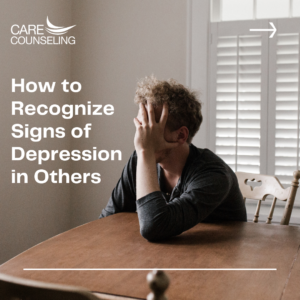Recognizing the Signs of Depression in Yourself and Others
 Depression is a common mental health condition that affects millions of people worldwide. It can be challenging to identify, both in ourselves and in those around us, as its symptoms often manifest differently in each individual. However, recognizing the signs of depression is the first step towards seeking help and providing support.
Depression is a common mental health condition that affects millions of people worldwide. It can be challenging to identify, both in ourselves and in those around us, as its symptoms often manifest differently in each individual. However, recognizing the signs of depression is the first step towards seeking help and providing support.
Understanding Depression
Depression is more than just occasional sadness; it is a persistent and pervasive feeling of hopelessness, sadness, and apathy that can interfere with daily life. It affects not only one’s emotional state but also physical health, relationships, and overall well-being.
Recognizing Signs of Depression in Yourself
- Persistent Sadness: Feeling sad, empty, or down most of the day, nearly every day, for at least two weeks is a common sign of depression.
- Loss of Interest: A sudden disinterest or lack of pleasure in activities or hobbies that once brought joy can indicate depression.
- Changes in Appetite or Weight: Significant changes in appetite, leading to weight loss or gain, can be a sign of depression.
- Sleep Problems: Insomnia or oversleeping, along with disrupted sleep patterns, are common in depression.
- Fatigue: Feeling constantly tired and lacking energy, even after a full night’s sleep, is a frequent symptom.
- Difficulty Concentrating: Depression can affect cognitive function, leading to trouble focusing, making decisions, or remembering things.
- Feelings of Worthlessness: A pervasive sense of worthlessness, guilt, or self-criticism is often associated with depression.
- Physical Symptoms: Depression can manifest physically as aches, pains, and digestive problems without a clear medical cause.
- Suicidal Thoughts: In severe cases, individuals may have thoughts of self-harm or suicide. If you or someone you know is experiencing these thoughts, seek immediate help.
Recognizing Signs of Depression in Others
- Withdrawal: Notice if someone has become increasingly isolated, canceling plans or avoiding social interactions.
- Mood Swings: Watch for drastic changes in mood, especially if someone becomes irritable, agitated, or unusually tearful.
- Loss of Interest: If a person abruptly loses interest in activities they once enjoyed, it may be a sign of depression.
- Neglecting Responsibilities: Missing work, school, or neglecting personal responsibilities can be an indication that something is amiss.
- Changes in Appearance: Dramatic weight changes, poor hygiene, or a disheveled appearance might suggest depression.
- Substance Abuse: Increased alcohol or drug use can be a way for some individuals to cope with depression.
- Expressions of Hopelessness: Listen for statements like “I can’t go on” or “It’s not worth it,” which may indicate feelings of hopelessness.
How to Approach Someone with Concern
- Choose the Right Time and Place: Find a private and comfortable setting where you can talk without distractions.
- Express Your Concerns: Begin the conversation with empathy and concern, expressing your observations and worries.
- Be a Good Listener: Allow the person to share their feelings and experiences without judgment. Listening attentively can provide immense relief.
- Offer Support: Encourage seeking professional help and provide information on mental health resources, such as therapy or counseling services.
- Stay Connected: Continue to reach out and offer support, even if the person initially declines help. Let them know you’re there for them.
Recognizing Signs of Depression in Children and Teens
Depression can affect individuals of all ages, including children and teenagers. Signs of depression in young individuals may include:
- Persistent irritability
- Withdrawal from friends and family
- Changes in school performance
- Frequent physical complaints (headaches, stomachaches)
- Risky behaviors or substance abuse
If you suspect depression in a child or teen, consult a mental health professional or a school counselor for guidance and support.
Recognizing the signs of depression in yourself or others is a crucial step in addressing this mental health condition. Depression is treatable, and with the right support, individuals can find their way to recovery. Remember that seeking professional help from a mental health expert is often the most effective way to manage depression. Be compassionate, patient, and understanding, and remember that mental health should be a priority for everyone.



























